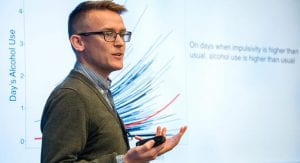 An interview with David Lydon-Staley, PhD
An interview with David Lydon-Staley, PhD
Assistant Professor of Communication, Annenberg School for Communication
10/15/20
Were you always interested in research and science when growing up?
I’ve always been changing my mind about what I want to do. I like having a lot of options, and I find everything interesting. When I was growing up, I went through a whole phase of, “I want to be an astronaut. I want to be a scientist,” not knowing what a scientist was, it just looked cool. Before undergrad, my schooling was in Ireland, and when I was in secondary school, which is kind of like a combination between middle school and high school, I got really obsessed with art, so I wanted to be an artist, and then I also really loved the science classes I was taking, so I wanted to be a scientist, and then I started to really like math, so I thought, maybe I’ll be an actuary.
For the last two years of high school, I was always thinking about what I was going to do next, and I was first gen college student, so I didn’t really know what a PhD was, what even going to college entailed, and so I was always thinking, “Oh, I know what it’s like to be a teacher, and I love school, so I’ll be a high school teacher.” And then I fell in love with English Literature. So when it came time to pick what I was going to study in college, I applied to study English and Math. Then over the summer, right before you’re supposed to make your last decision…I switched to English and psychology, not really knowing what psychology was.
What are the questions that are exciting to you right now that you’re focusing on?
I’m generally interested in what people are doing in their day-to-day lives. We study big picture questions like depression and substance use and curiosity. I care a lot about your day-to-day life, because ultimately, what you do day-to-day is setting you up for the rest of your life, [for example], whether you exercise or not in a day, how consistently you exercise. If you’re a person who smokes, even though you might smoke for months and years and decades, we have to study you to see what happens to lead you to smoke in the first place, every single cigarette is interesting to me because I want to know what led you to smoke that individual cigarette because there was something that happened right before that motivated you to smoke, and then whatever happened afterwards led you to sustain that habit. I’m really interested in zooming into those individual moments as people go about their daily lives for all those reasons.
Where do you think the future of your field will go?
The things that really excite me are the approaches of collecting lots of data on individuals. The field has been doing this for a while in terms of daily diaries and smartphone surveys. But there’s some interesting work being done now where they are developing ways of capturing people’s daily lives that don’t need to stop people in the midst of everything they’re doing and ask, “Hey, how are you doing?” It’s a type of passive data collection. For example, some researchers are taking snapshots of peoples smartphone screens every 5 seconds for months, and are interrogating those time series of the snapshots which gives a rich and detailed picture of people’s everyday engagement with media.
Has doing research on such topics impacted you personally?
Before I had come to the study of emotions, it was very easy to think, “I don’t want to feel sad, I don’t want to feel angry, I don’t want feel anxious, these feelings are just annoying me and they’re getting in the way of my everyday life.” But, when you start digging into the literature, you find that we have emotions for a reason, so I started paying more attention to that. What was making me anxious? What was my body telling me? Turning the microscope on myself has made me more in tune with my emotions. I started thinking of them as superpowers.
In grad school, I would always get anxious before talks, and because of that, I always used to prepare an insane amount for a talk, it was like, “This is too much work to put in to a talk.” But then my professor was like, “Well, this is your superpower, it’s like your body is making you anxious because you want to be prepared,” and I think reframing it like that was part of turning the microscope on myself and being like, “Well, these are signals that maybe I should be listening to.”
To learn more about Dr. Lydon-Staley and his work, click here.
Click here to go back to the “Interviews with Scientists” page.
